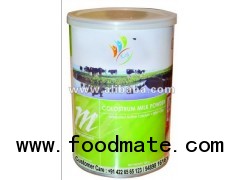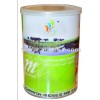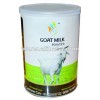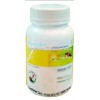Colostrum is the pre-milk fluid produced from the mothers mammary glands during the first few days after birth. Bovine colostrum is derived from cows.Colostrum is a rich source of antibodies, growth factors and nutrients for the suckling neonate and may provide passive immunity to the newborn against various infectious microorganisms, particularly those that affect the gastrointestinal tract. It may also have other health benefits. The protein content of bovine colostrum is three to four times higher up to 150 grams per litre compared to 30 to 40 grams per litre than it is in regular cow's milk. The greater part of this protein is comprised of whey proteins. Immunoglobulins, mainly IgG, make up
Bovine colostrum may also contain colostrinin, also known as proline-rich polypeptide (PRP), a substance found in ovine colostrum.Bovine colostrum prepared by microfiltration is mainly composed of whey proteins and their associated immunoglobulins and the growth factors IGF-1, IGF-2, TGFbeta and EGF. Substances such as lactose, fats, casein and lactalbumin are significantly reduced in microfiltered bovine colostrum. Hyperimmune bovine colostrum is rich in immunoglobulins of the IgG type, which are protective against such infectious microorganisms as Cryptosporidium parvum (a major cause of AIDS-associated diarrhea), diarrheogenic Escherichia coli strains, Shigella flexneri, Clostridium difficile, and rotavirus, the most common cause of severe diarrhea in young children.Hyperimmune bovine colostrums IgG concentrate is an orphan drug for the treatment of diarrhea in AIDS patients caused by infection with Cryptosporidium parvum.
HowDoes It Work?
Mechanism Of Action,Pharmacokinetics
Colostrum is highly beneficial in the unique manner in which it provides the body with its numerous immune factors. Most infectious disease-causing organisms enter the body through the mucous membranes of the intestinal tract. In order to remain healthy, it is critical that we are able to combat disease-causingorganisms: bacteria, viruses, pollutants, contaminants and allergens where they attack us. Clinical research by Dr. David Tyrell, in England, in 1980, revealed that a high percentage of the antibodies and immunoglobulins present in colostrum are believed not to be absorbed but remain in the intestinal tract where they attack disease causing organisms before they penetrate the body and cause disease. It is this combination of action that is believed to make colostrum so unique and effective as an oral supplement.Hyperimmune bovine colostrum may have antimicrobial activity based on the ability of specific immunoglobulins of the IgG type to react with bacterial, viral and other microbiological antigens in the gut. It may also contain colostrinin or proline-rich polypeptide (PRP), another possible immunomodulatory substance. The combination of specific, as well as nonspecific, IgGs and such immunomodulatory factors as lactoferrin and PRP may afford general antimicrobial protection of the gastrointestinal tract.The pharmacokinetics of bovine colostrum, particularly with regard to the immunoglobulins, is unclear.
This suggests that some immunoglobulins may be more resistant to degradation in the gut. Growth factors and other peptides and proteins in bovine colostrums are most likely degraded by proteolytic enzymes and absorbed, distributed and metabolized in the same fashion as similar dietary substances.










